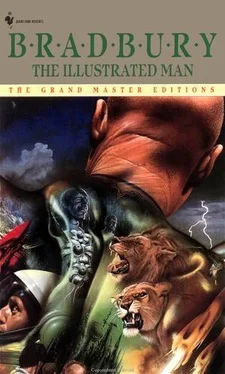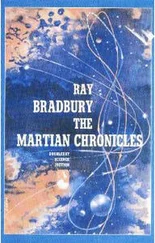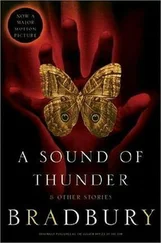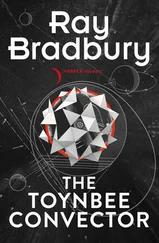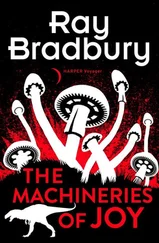Ray Bradbury - The Illustrated Man
Здесь есть возможность читать онлайн «Ray Bradbury - The Illustrated Man» весь текст электронной книги совершенно бесплатно (целиком полную версию без сокращений). В некоторых случаях можно слушать аудио, скачать через торрент в формате fb2 и присутствует краткое содержание. Жанр: Фантастика и фэнтези, на английском языке. Описание произведения, (предисловие) а так же отзывы посетителей доступны на портале библиотеки ЛибКат.
- Название:The Illustrated Man
- Автор:
- Жанр:
- Год:неизвестен
- ISBN:нет данных
- Рейтинг книги:3 / 5. Голосов: 1
-
Избранное:Добавить в избранное
- Отзывы:
-
Ваша оценка:
- 60
- 1
- 2
- 3
- 4
- 5
The Illustrated Man: краткое содержание, описание и аннотация
Предлагаем к чтению аннотацию, описание, краткое содержание или предисловие (зависит от того, что написал сам автор книги «The Illustrated Man»). Если вы не нашли необходимую информацию о книге — напишите в комментариях, мы постараемся отыскать её.
The Illustrated Man — читать онлайн бесплатно полную книгу (весь текст) целиком
Ниже представлен текст книги, разбитый по страницам. Система сохранения места последней прочитанной страницы, позволяет с удобством читать онлайн бесплатно книгу «The Illustrated Man», без необходимости каждый раз заново искать на чём Вы остановились. Поставьте закладку, и сможете в любой момент перейти на страницу, на которой закончили чтение.
Интервал:
Закладка:
“But other times—”
“Other times I can’t help myself. I bake pies and treat him as if he were alive, and then it hurts. No, it’s better to think he hasn’t been here for ten years and I’ll never see him again. It doesn’t hurt as much.”
“Didn’t he say next time he’d settle down.”
She shook her head slowly. “No, he’s dead. I’m very sure of that.”
“He’ll come alive again, then,” I said.
“Ten years ago,” said Mother, “I thought, What if he dies on Venus? Then we’ll never be able to see Venus again. What if he dies on Mars? We’ll never be able to look at Mars again, all red in the sky, without wanting to go in and lock the door. Or what if he died on Jupiter or Saturn or Neptune? On those nights when those planets were high in the sky, we wouldn’t want to have anything to do with the stars.”
“I guess not,” I said.
The message came the next day.
The messenger gave it to me and I read it standing on the porch. The sun was setting. Mom stood in the screen door behind me, watching me fold the message and put it in my pocket.
“Mom,” I said.
“Don’t tell me anything I don’t already know,” she said.
She didn’t cry.
Well, it wasn’t Mars, and it wasn’t Venus, and it wasn’t Jupiter or Saturn that killed him. We wouldn’t have to think of him every time Jupiter or Saturn or Mars lit up the evening sky.
This was different.
His ship had fallen into the sun.
And the sun was big and fiery and merciless, and it was always in the sky and you couldn’t get away from it.
So for a long time after my father died my mother slept through the days and wouldn’t go out. We had breakfast at midnight and lunch at three in the morning, and dinner at the cold dim hour of 6 A.M. We went to all-night shows and went to bed at sunrise.
And, for a long while, the only days we ever went out to walk were the days when it was raining and there was no sun.
The Fire Balloons
FIRE exploded over summer night lawns. You saw sparkling faces of uncles and aunts. Skyrockets fell up in the brown shining eyes of cousins on the porch, and the cold charred sticks thumped down in dry meadows far away.
The Very Reverend Father Joseph Daniel Peregrine opened his eyes. What a dream: he and his cousins with their fiery play at his grandfather’s ancient Ohio home so many years ago!
He lay listening to the great hollow of the church, the other cells where other Fathers lay. Had they, too, on the eve of the flight of the rocket Crucifix, lain with memories of the Fourth of July? Yes. This was like those breathless Independence dawns when you waited for the first concussion and rushed out on the dewy sidewalks, your hands full of loud miracles.
So here they were, the Episcopal Fathers, in the breathing dawn before they pinwheeled off to Mars, leaving their incense through the velvet cathedral of space.
“Should we go at all?” whispered Father Peregrine. “Shouldn’t we solve our own sins on Earth? Aren’t we running from our lives here?”
He arose, his fleshy body, with its rich look of strawberries, milk, and steak, moving heavily.
“Or is it sloth?” he wondered. “Do I dread the journey?”
He stepped into the needle-spray shower.
“But I shall take you to Mars, body.” He addressed himself. “Leaving old sins here. And on to Mars to find new sins?” A delightful thought almost. Sins no one had ever thought of.
Oh, he himself had written a little book: The Problem of Sin on Other Worlds , ignored as somehow not serious enough by his Episcopal brethren.
Only last night, over a final cigar, he and Father Stone had talked of it.
“On Mars sin might appear as virtue. We must guard against virtuous acts there that, later, might be found to be sins!” said Father Peregrine, beaming. “How exciting! It’s been centuries since so much adventure has accompanied the prospect of being a missionary!”
“ I will recognize sin,” said Father Stone bluntly, “even on Mars.”
“Oh, we priests pride ourselves on being litmus paper, changing color in sin’s presence,” retorted Father Peregrine, “but what if Martian chemistry is such we do not color at all! If there are new senses on Mars, you must admit the possibility of unrecognizable sin.”
“If there is no malice aforethought, there is no sin or punishment for same—the Lord assures us that,” Father Stone replied.
“On Earth, yes. But perhaps a Martian sin might inform the subconscious of its evil, telepathically, leaving the conscious mind of man free to act, seemingly without malice! What then?”
“What could there be in the way of new sins?”
Father Peregrine leaned heavily forward. “Adam alone did not sin. Add Eve and you add temptation. Add a second man and you make adultery possible. With the addition of sex or people, you add sin. If men were armless they could not strangle with their hands. You would not have that particular sin of murder. Add arms, and you add the possibility of a new violence. Amoebas cannot sin because they reproduce by fission. They do not covet wives or murder each other. Add sex to amoebas, add arms and legs, and you would have murder and adultery. Add an arm or leg or person, or take away each, and you add or subtract possible evil. On Mars, what if there are five new senses, organs, invisible limbs we can’t conceive of—then mightn’t there be five new sins?”
Father Stone gasped. “I think you enjoy this sort of thing!”
“I keep my mind alive, Father; just alive, is all.”
“Your mind’s always juggling, isn’t it?—mirrors, torches, plates.”
“Yes. Because sometimes the Church seems like those posed circus tableaus where the curtain lifts and men, white, zinc-oxide, talcum-powder statues, freeze to represent abstract Beauty. Very wonderful. But I hope there will always be room for me to dart about among the statues, don’t you, Father Stone?”
Father Stone had moved away. “I think we’d better go to bed. In a few hours we’ll be jumping up to see your new sins, Father Peregrine.”
The rocket stood ready for the firing.
The Fathers walked from their devotions in the chilly morning, many a fine priest from New York or Chicago or Los Angeles—the Church was sending its best—walking across town to the frosty field. Walking, Father Peregrine remembered the Bishop’s words:
“Father Peregrine, you will captain the missionaries, with Father Stone at your side. Having chosen you for this serious task, I find my reasons deplorably obscure, Father, but your pamphlet on planetary sin did not go unread. You are a flexible man. And Mars is like that uncleaned closet we have neglected for millenniums. Sin has collected there like bric-a-brac. Mars is twice Earth’s age and has had double the number of Saturday nights, liquor baths, and eye-poppings at women as naked as white seals. When we open that closet door, things will fall on us. We need a quick, flexible man—one whose mind can dodge. Anyone a little too dogmatic might break in two. I feel you’ll be resilient. Father, the job is yours.”
The Bishop and the Fathers knelt.
The blessing was said and the rocket given a little shower of holy water. Arising, the Bishop addressed them:
“I know you will go with God, to prepare the Martians for the reception of His Truth. I wish you all a thoughtful journey.”
They filed past the Bishop, twenty men, robes whispering, to deliver their hands into his kind hands before passing into the cleansed projectile.
“I wonder,” said Father Peregrine, at the last moment, “if Mars is hell? Only waiting for our arrival before it bursts into brimstone and fire.”
Читать дальшеИнтервал:
Закладка:
Похожие книги на «The Illustrated Man»
Представляем Вашему вниманию похожие книги на «The Illustrated Man» списком для выбора. Мы отобрали схожую по названию и смыслу литературу в надежде предоставить читателям больше вариантов отыскать новые, интересные, ещё непрочитанные произведения.
Обсуждение, отзывы о книге «The Illustrated Man» и просто собственные мнения читателей. Оставьте ваши комментарии, напишите, что Вы думаете о произведении, его смысле или главных героях. Укажите что конкретно понравилось, а что нет, и почему Вы так считаете.
